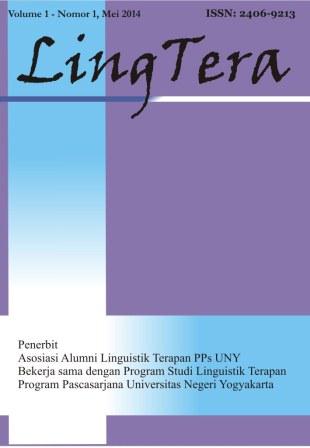TEACHERS' PERCEPTIONS ON USING COMMUNICATIVE LANGUAGE TEACHING IN THE ENGLISH CLASS
DOI:
https://doi.org/10.21831/lt.v3i2.11137Keywords:
CLT (Communicative Language Teaching), ESP (English for Specific Purposes), communicative competence, attitude, challenge, implementationAbstract
References
Brown, H. D.(1994). Teaching by principles: An interactive approach to language pedagogy. Upper Saddle River, New Jersey: Prentice Hall Regents.
Brown, H. D.(2007). Principles of language learning and teaching. New York: Pearson Education, Inc.
Denscombe, M. (2007). The good research guide. New York: The Open University press.
Fishbein, M., & Ajzen, I. (1975). Belief, attitude, intention and behavior: An introduction to theory and research. Reading, MA: Addison-Wesley Publishing Company
Harmer, J. (2006). The practice of English language teaching. London: Longman.
Isaac, S & Michael, B. (1981). Handbook in research and evaluation. California: EdITS publishers.
Karavas-Doukas, E. (1996). Using attitude scales to investigate teachers' attitudes to the communicative approach. ELT Journal, 50(3), 187-196.
Koosha, M & Yakhabi M. (2013). Problems Associated with the Use of Communicative Language Teaching in EFL Contexts and Possible Solutions. International Journal of Foreign Languages Teaching and Learning. Accessed on the date of 1-st April 2014, from http://jfl.iaun.ac.ir/article_4185_0.html
Li, D. (1998). "It's always more difficult than you plan and imagine": Teachers' perceived difficulties in introducing the communicative approach in South Korea. TESOL Quarterly, 32 (4), 677-703.
Littlewood, W. T. (1981). Communicative language teaching: An introduction. Cambridge: Cambridge University Press.
Miles, B. M & Huberman, A. M. (1994). Qualitative data analysis. London: International Educational and Professional Publisher
Patel. M.F & Jain. P.M. (2008). English language teaching. (Methods, Tools and Techniques). Jaipur: Sunrise publishers and distributors.
Richards, J. C & Rodgers, T. (2001). Approaches and methods in language teaching (2nd ed.). New York: Cambridge University Press.
Richards, J. C. (2006). Communicative language teaching today. New York: Cambridge University Press.
Sadoughvanini, S & Shamsudin, S. Communicative approach to language teaching and learning in EFL context. Accessed on the date of 5-th May 2014 from http://www.aessweb.com/journaldetai=5019
Savignon, J. S. (2002). Interpreting communicative language teaching. New Haven & London: Yale University Press
Downloads
Published
How to Cite
Issue
Section
Citation Check
License
LingTera allows readers to read, download, copy, distribute, print, search, or link to its articles' full texts and allows readers to use them for any other lawful purpose. The journal allows the author(s) to hold the copyright without restrictions. Finally, the journal allows the author(s) to retain publishing rights without restrictions.
- Authors are allowed to archive their submitted articles in an open-access repository.
- Authors are allowed to archive the final published article in an open-access repository with an acknowledgment of its initial publication in this journal.

Psychology, Evaluation, and Technology in Educational Research is licensed under a Creative Commons Attribution-ShareAlike 4.0 International License.
Based on a work at https://petier.org/index.php/PETIER.










